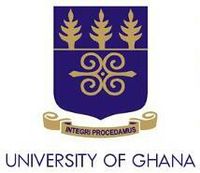University College of the Gold Coast

Arms of the University of Ghana
|
|
| Motto | Integri Procedamus |
|---|---|
| Type | Public |
| Established | 1948 |
| Chairman | Justice Date-Baah |
| Chancellor | Kofi Annan |
| Vice-Chancellor | Ebenezer Oduro Owusu |
| Students | 38,000 |
| Address |
University of Ghana P.O. Box LG 25 Legon, Ghana, Accra, Greater Accra Region, Ghana 05°39′03″N 00°11′13″W / 5.65083°N 0.18694°W |
| Campus | Suburban area |
| Colours |
Midnight Blue, Lemon Yellow and Vegas Gold |
| Nickname | Legon |
| Affiliations | See below |
| Website | www.ug.edu.gh |
 |
|
The University of Ghana is the oldest and largest of the thirteen Ghanaian universities and tertiary institutions. It was founded in 1948 as the University College of the Gold Coast, and was originally an affiliate college of the University of London, which supervised its academic programmes and awarded degrees. It gained full university status in 1961, and now has nearly 40,000 students.
The original emphasis was on the liberal arts, social sciences, basic science, agriculture, and medicine, but (partly as the result of a national educational reform programme) the curriculum was expanded to provide more technology-based and vocational courses and postgraduate training.
The university is mainly based at Legon, about 12 kilometres northeast of the centre of Accra. The medical school is in Korle Bu, with a teaching hospital and secondary campus in the city of Accra. It also has a graduate school of nuclear and allied sciences at the Ghana Atomic Energy Commission, making it one of the few universities on the Africa continent offering programmes in nuclear physics and nuclear engineering.
The formation of the West African Commission of the Asquith Commission on Higher Education in the Colonies under the chairmanship of Rt. Hon. Walter Elliot was the birth of this notable institution in 1948. The commission recommended the setting up of university colleges in association with the University of London, thus the University College of the Gold Coast was founded by Ordinance on 11 August 1948 for the purpose of providing for and promoting university education, learning and research. This was made possible by the rejection of the first recommendation which stated that only one university college was feasible for the whole of British West Africa, which would be located in Nigeria by the people of Gold Coast led by the scholar and politician, the late Dr. J. B. Danquah.
...
Wikipedia
